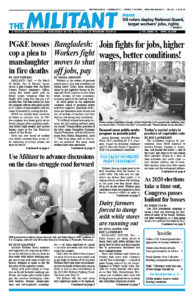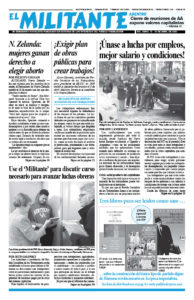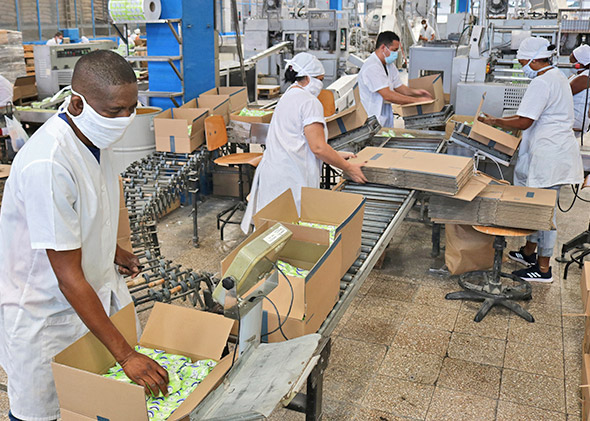Many working people in the United States are inspired when they learn how revolutionary Cuba confronts crises from hurricanes, droughts or today’s coronavirus outbreak, as opposed to the capitalist rulers in the U.S. and elsewhere.
Tens of thousands of members of Cuba’s mass organizations, including the trade unions, the Federation of Cuban Women, and the neighborhood Committees for the Defense of the Revolution, as well as medical students and others, have been organized to go door to door across this island-nation looking to find everyone who might be sick, infected or need help.
The figures sound impossible — on March 26, volunteers checked in on 4,782,231 people, including 521,364 senior citizens, who are most vulnerable to the disease. On March 30, they checked on 8,358,561! Many of these are the second or third visits.
They make sure that anyone who needs medical attention, gets it. The message — no one is left on their own.
That’s how working people and their government transformed by a social revolution and reorganization of society based on people’s needs, not on profit, deals with every challenge. That’s why U.S. bosses and their government are determined to overturn their revolution.
Cuban revolutionaries also “share what they have, not what’s left over” in aiding others around the world. Some 30,000 Cuban health care workers are volunteers providing medical care in 65 countries around the world. Their numbers have been boosted in the last few weeks by internationalist brigades responding to requests from 15 countries in Europe, Latin America and the Caribbean to aid in fighting the current epidemic.
Unlike Cuba where health care is a right, under capitalism it’s just another commodity, used to fill the coffers of giant insurance, pharmaceutical and hospital corporations.
When Danni Askini started feeling chest pain in February in the Boston area, Time magazine reported, her doctor told her to go to a hospital emergency room. When she got there, they told her it was likely pneumonia and sent her home. When the bill came, it was $5,645.
She got sicker and went back to the ER twice, where they tested and treated her and sent her home again. Three days later they told her she had COVID-19. Then she got the total bill — $34,927.43!
Everything costs. And the message is: You’re on your own.
Cuba is different because working people — led by Fidel Castro, the Rebel Army and the July 26 Movement — made a revolution in 1959, replacing the U.S.-backed capitalist dictatorship of Fulgencio Batista with their own workers and farmers government. This new state power is the mightiest weapon working people have to defend their class interests.
Working people are also organizing to confront the deepening impact of the worldwide capitalist economic depression and standstill in trade, on top of Washington’s over 60-year-long economic war against them, which makes it ever harder to get imports, including food, oil and raw materials needed for agriculture and industry.
The Cuban government is not shutting down factories, it’s relying on working people to work together to increase production of the products the Cuban people need, whatever the difficulties.
An article in Juventud Rebelde April 3 describes how vegetable farmers are looking for alternatives to scarce fuel, fertilizer and pesticides, including new ways to irrigate their fields. “We’re not stopping,” said Luis Pentón Ramírez, a farmer in Banao, Sancti Spíritus. “We can’t leave people without their plate of food.”
In the U.S., where capitalists are looking for every way they can to profit off the epidemic, the price of eggs in many stores in New York City has more than doubled in the last few weeks. As has the price of hand sanitizer and face masks. Giant corporations like Walmart are imposing speedup on their workers to make money hand over fist while thousands of small businesses are being bankrupted.
In Cuba, they have taken the opposite class approach.
The regional government in Matanzas province has added 15 pounds a month of fresh fruits, vegetables and grains to the government-subsidized ration card, which guarantees that everyone gets basic products at low costs.
Much of the food that was being grown for the tourist trade — which has been closed for the time being — is being sent instead to hospitals and centers serving people who are under quarantine. Some of the rest is sent to local agriculture markets, at a price set a maximum of 20% higher than the ration book.
This is the opposite of what is happening in the U.S. Dairy farmers are being told by the big co-ops to dump their milk. Farmers who produced for the shuttered restaurant and hospitality market are being forced to destroy their crops and take a total loss.
The Cuban Communist Party decided March 31 they had to cancel the annual May Day march of millions to prevent further spread of the virus. At the same time, the Central Organization of Cuban Workers was asked to make new proposals on how Cubans could work together to celebrate May Day and their revolution “so that International Workers Day is not overlooked.”


